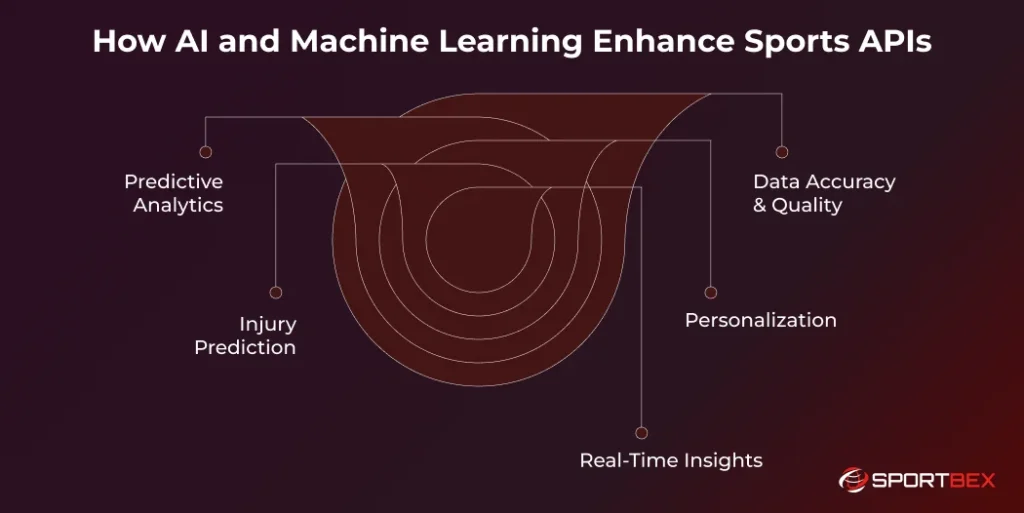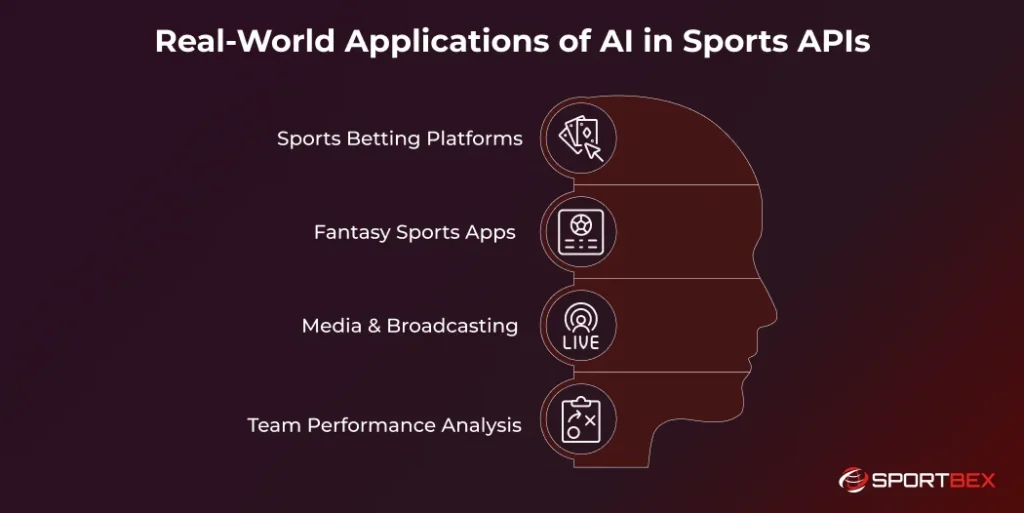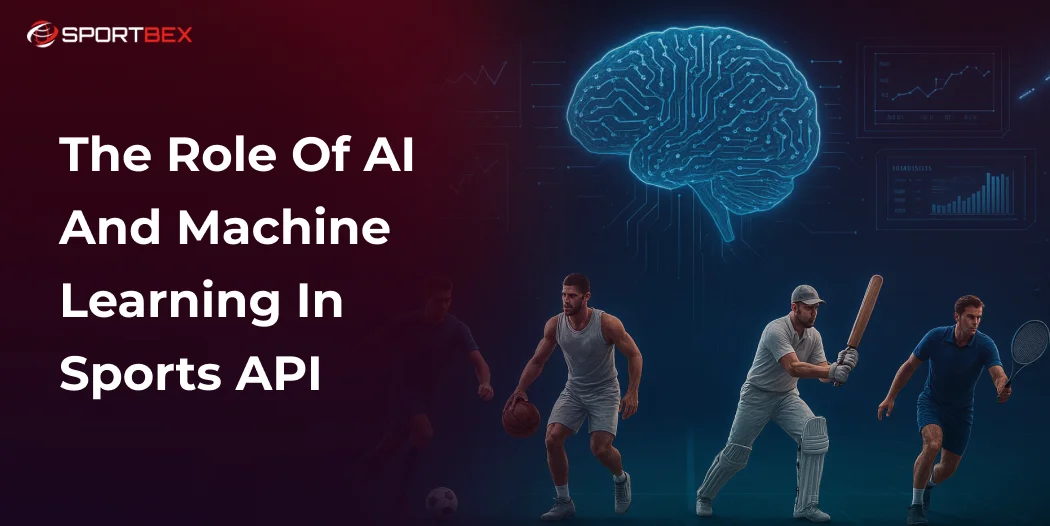Sports have always been about data, from scores to player stats. But collecting and using this info used to be slow and limited. Now, with artificial intelligence (AI), machine learning (ML), and sports APIs, we’ve totally changed how sports data is gathered, used, and understood across the industry.
Sports data API tools connect platforms and provide real-time data. With the help of AI and ML in Sports, this data becomes smarter and more useful. Together, they make it possible to get instant match updates, analyze performance, predict injuries, and create personalized fan experiences. These technologies are transforming how athletes train, coaches plan, businesses connect with fans, and developers create new sports apps.
In this article, we’ll explore the role of AI and machine learning in sports API. We’ll highlight their impact on sports APIs, the benefits they bring, real-world applications, and what the future holds for data-driven sports innovation.
What is a Sports API?
Before diving into AI and machine learning, let’s cover the basics: the sports API. An API acts as a middleman, allowing different software programs to communicate.
In the context of sports, a sports API is a specialized interface designed to deliver sports-related data. It’s like a special connection that sends lots of sports information to apps that need it. This information can include a wide array of data points:
- Schedules and Fixtures: Upcoming games, match times, and locations.
- Scores and Results: Real-time scores, final results, and historical game outcomes.
- Player Statistics: Individual performance metrics like points scored, assists, rebounds, or goals.
- Team Statistics: Collective data such as win-loss records, possession percentages, and defensive stats.
- Odds and Betting Lines: Data from bookmakers for sports betting applications.
- Event Timelines: Detailed play-by-play information for live games.
Developers use a Sports Data API to create many different applications. These can range from simple websites that track scores to complex fantasy sports platforms and advanced betting tools. For apps that need instant match insights, a live Sports Data API ensures accuracy and speed, keeping users engaged in real time.
The Role of AI and Machine Learning in Sports Data
A standard sports API is great for providing raw data, but adding AI and machine learning takes it to the next level. AI means creating machines that can think and act like humans. Machine learning is a type of AI where algorithms learn from data to make predictions or decisions on their own, without being directly programmed.
In the context of sports data, AI and the role of machine learning in sports stats API include several critical functions:
- Data Ingestion and Validation: Sports data comes from live games, official reports, and scorekeepers. AI helps collect this real time sports data automatically and makes sure it’s correct. Machine learning can spot unusual things, like a player scoring too many points too fast, and alerts someone to double-check it.
- Pattern Recognition: The human eye can only handle so much information, but Sports machine learning can analyze millions of data points to find patterns we might miss. For example, it could spot a team playing better in certain weather or a player’s performance dropping against a specific opponent.
- Predictive Modeling: Machine learning is great at predicting the future. It uses past information to guess what will happen next. This means it can predict who might win a game, how well a player will perform, or even when an injury might happen.
- Natural Language Processing (NLP): A lot of sports information is found in unstructured formats like news articles, social media posts, and interviews. Natural Language Processing is a type of AI that helps machines understand human language. An AI-powered sports data API can extract insights like player opinions, injury updates, and transfer rumors.
AI and machine learning work like a smart filter for sports API data. They sort through the basic information, add context, and turn it into valuable insights that can be used to build better and more engaging sports apps.
How AI and Machine Learning Enhance Sports APIs

Data Accuracy & Quality
The success of any sports app depends on accurate data. A wrong score or a late update can quickly lose users’ trust. That’s why AI and machine learning are so important for keeping sports data reliable.
Machine learning models can check data from different sources at the same time. If one source reports a goal but others don’t, the AI can flag it for a person to review or trust the majority. Models automatically spot and fix common errors like typos, improving data quality faster and more accurately than manual checks, ensuring reliable real-time sports data.
Predictive Analytics
Predictive analytics is one of the most exciting uses of AI in sports API technology. It works by using machine learning models to look at past data and predict what might happen in the future.
For instance, a sports API enhanced with predictive AI can provide:
- Match Outcome Predictions: AI predicts game outcomes by analyzing historical performance, player form, head-to-head records, and travel distance.
- Player Performance Projections: Machine learning projects player performance for upcoming games, aiding Fantasy Sports Apps users in building stronger teams.
- In-Game Predictions: During live matches, AI continuously updates predictions as events unfold, instantly adjusting win probabilities after events like a touchdown or red card.
Personalization
Modern sports fans expect personalized experiences, and AI makes this possible. An AI-powered sports data API can customize content based on what fans care about, like their favorite teams, players, or fantasy rosters. Here’s how it works:
- Personalized News Feeds: Show updates and articles about a fan’s favorite teams.
- Custom Notifications: Send alerts for big moments involving their favorite players.
- Tailored Data Visualizations: Create dashboards with stats and analytics that matter most to each fan.
This kind of personalization keeps fans more engaged and connected to the sports they love.
Injury Prediction
Player injuries are a big deal for teams, coaches, fans, and fantasy leagues. Luckily, machine learning (AI) is getting really good at predicting and even preventing them.
AI can use data like how much a player trains, their fitness tracker info, and past injuries to find signs that they might get hurt. A smart sports API can warn teams about these risks. Teams can then adjust practice schedules or give players a break to help prevent injuries. This is a big win for keeping players healthy in professional sports.
Real-Time Insights
Traditional sports data tells you what happened in a game. AI can tell you why it happened and predict what could happen next, all while the game is still going on. During a live game, AI can look at the data from each play to give instant updates and predictions.
During a basketball game, an AI-powered sports API can spot patterns, like a team struggling with three-point shots against a certain defender, or in soccer, a formation change leading to more scoring chances.
These real-time insights help broadcasters improve commentary and coaches make better in-game decisions. This AI-powered technology is crucial for Live Sports Streaming, offering viewers a deeper understanding of the action.
Real-World Applications of AI in Sports APIs

Sports Betting Platforms
The Sports Betting Industry has been one of the earliest and biggest adopters of AI in sports APIs. Even a small edge can make a huge difference, and AI provides exactly that.
Odds Generation: Bookmakers use machine learning to set and update betting odds by analyzing data like team form, injuries, market sentiment, and weather. AI-powered sports data APIs enable real-time odds adjustments during matches.
Arbitrage Betting: AI algorithms scan odds from hundreds of bookmakers at once, spotting opportunities where bettors can cover all outcomes and guarantee a profit.
Predictive Tools for Bettors: Many platforms now offer users AI-driven predictions and value bet alerts. This levels the playing field, giving casual bettors access to tools once reserved for professionals.
Fantasy Sports Apps
Fantasy sports live and breathe data, and AI makes that data smarter. Millions of fantasy players depend on accurate projections to build winning teams, making AI-enhanced Fantasy Sports APIs essential.
Player Projections: Machine learning provides detailed player performance forecasts, forming the backbone of fantasy team decisions.
Draft Assistants: AI-powered tools suggest the best draft picks in real time based on player value, projected performance, and roster needs.
Automated Insights: Fantasy apps now deliver personalized advice like trade suggestions or waiver wire alerts powered by AI analysis of each user’s roster and the broader player pool.
Media & Broadcasting
Broadcasters are using AI in sports APIs to enhance live coverage and deliver richer, more engaging content.
Automated Highlights: AI scans live games, identifies key plays (goals, touchdowns, big moments), and creates instant highlight reels for social media and digital platforms.
Real-Time Graphics and Stats: APIs deliver on-screen graphics with advanced metrics, such as a player’s scoring probability from a certain position. This adds context and depth to the broadcast.
Storytelling: NLP analyzes game data to uncover narratives like a player chasing a personal record or a dramatic comeback, giving commentators fresh storylines in real time.
Media & Broadcasting
Broadcasters are using AI in sports APIs to enhance live coverage and deliver richer, more engaging content.
Automated Highlights: AI scans live games, identifies key plays (goals, touchdowns, big moments), and creates instant highlight reels for social media and digital platforms.
Real-Time Graphics and Stats: APIs deliver on-screen graphics with advanced metrics, such as a player’s scoring probability from a certain position. This adds context and depth to the broadcast.
Storytelling: NLP analyzes game data to uncover narratives like a player chasing a personal record or a dramatic comeback, giving commentators fresh storylines in real time.
Team Performance Analysis
Professional teams now operate as data-driven organizations, using AI-powered sports APIs to gain a clear competitive advantage through machine learning sports technologies.
Scouting and Recruitment: Machine learning analyzes global data to spot undervalued players who fit a team’s system, helping recruiters find hidden gems.
Tactical Analysis: Coaches can break down opponent strategies and their own team’s strengths and weaknesses using AI-driven insights from stats and video analysis.
Performance Monitoring: By combining API-driven stats with biometric data from wearables, teams can monitor player workload, fitness, and health. This helps optimize training schedules and prevent injuries or burnout.
Get a Ready-Made Platform On Rent.
Get Started Today
Conclusion
AI and machine learning have transformed sports APIs. They’ve gone from just giving out scores and stats to becoming powerful tools that offer deep insights and predictions. Now, these tools help bettors make smarter bets, fantasy players build better teams, broadcasters tell more engaging stories, and coaches improve athlete performance and safety.
Sure, there are still some challenges like incorrect data, high setup costs, and ethical issues. But the benefits, like real-time updates, accurate predictions, and personalized experiences, make AI-powered sports APIs an important part of today’s Sports Technology Trends.
AI will play an even bigger role in sports data, driving new ideas in betting, media, fantasy sports, and team management. The future of sports will be smarter, more predictable, and heavily based on data, all thanks to AI and advanced sports APIs.
Frequently Asked Questions
A Sports Data API is a tool that provides real-time sports data such as scores, player stats, schedules, and betting odds to applications, websites, and platforms.
AI adds intelligence to sports data APIs by analyzing raw data, recognizing patterns, and making predictions. This helps improve fan engagement, betting accuracy, and team performance analysis.
The role of machine learning in sports stats API is to process large volumes of historical and live data, identify hidden trends, and deliver accurate forecasts about player performance, game outcomes, and potential injuries.
AI-powered sports APIs are used in betting platforms for odds generation, fantasy sports apps for player projections, media for real-time highlights, and professional teams for scouting, training, and injury prevention.
Real-time sports data provides live match updates, and AI enhances it by delivering deeper insights, such as predicting game outcomes, highlighting key moments instantly, and suggesting personalized fan experiences.
Recent Blog
Which Real-Time Sports Data API Offers the Fastest Live Updates?
January 23, 2026
 9 min
9 min
How Does a Live Odds Provider Deliver Real-Time Betting Data
January 23, 2026
 7 min
7 min






